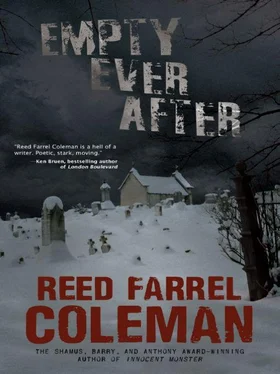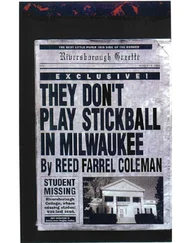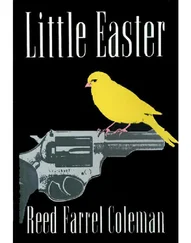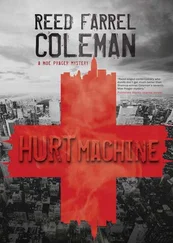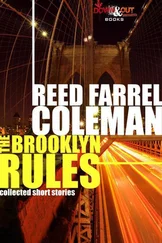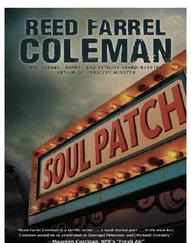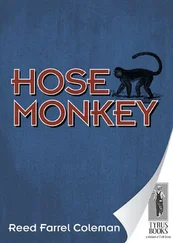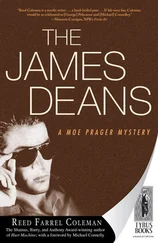Reed Coleman - Empty ever after
Здесь есть возможность читать онлайн «Reed Coleman - Empty ever after» весь текст электронной книги совершенно бесплатно (целиком полную версию без сокращений). В некоторых случаях можно слушать аудио, скачать через торрент в формате fb2 и присутствует краткое содержание. Жанр: Криминальный детектив, на английском языке. Описание произведения, (предисловие) а так же отзывы посетителей доступны на портале библиотеки ЛибКат.
- Название:Empty ever after
- Автор:
- Жанр:
- Год:неизвестен
- ISBN:нет данных
- Рейтинг книги:5 / 5. Голосов: 1
-
Избранное:Добавить в избранное
- Отзывы:
-
Ваша оценка:
- 100
- 1
- 2
- 3
- 4
- 5
Empty ever after: краткое содержание, описание и аннотация
Предлагаем к чтению аннотацию, описание, краткое содержание или предисловие (зависит от того, что написал сам автор книги «Empty ever after»). Если вы не нашли необходимую информацию о книге — напишите в комментариях, мы постараемся отыскать её.
Empty ever after — читать онлайн бесплатно полную книгу (весь текст) целиком
Ниже представлен текст книги, разбитый по страницам. Система сохранения места последней прочитанной страницы, позволяет с удобством читать онлайн бесплатно книгу «Empty ever after», без необходимости каждый раз заново искать на чём Вы остановились. Поставьте закладку, и сможете в любой момент перейти на страницу, на которой закончили чтение.
Интервал:
Закладка:
“He’ll be quite honored to hear it.”
“Oh, God, please don’t tell him.” She turned bright red. “I’m so embarrassed.”
“Don’t worry, your secret’s safe with me.” I’m certain she had no idea how safe. “Aaron’s great. You know, we own a store not too far from here?”
“Red, White and You. Yes, I’ve been there a few times, but no one I remember was around.”
“Klaus and Kosta are still with us. They even own a part of the business now.”
“Are they both still crazy?”
“As crazy as ever.” I changed subjects. “The walker, you said it was for your dad.”
“Used to be. He’s pretty much bedridden these days. Alzheimer’s,” she said, as if that explained everything. I guess maybe it did. I watched Alzheimer’s rob my friend and Pulitzer Prize-winning journalist, Yancy Whittle Fenn, of everything he ever had. First it erased his memory, then it erased him.
“Sorry.”
“That sorry I’ll accept.”
“Your mom?”
“She’s summering out West with some friends.”
“You take care of your dad?”
“We have round the clock nursing, but I see him a lot. We can afford to keep him close to the things he loved. I’m not sure how much of him is left. We take him down to the stables when we can. He seems to still enjoy that.”
“I remember he liked horses. Do you ride anymore?”
“Some.”
“The piano?”
“The great love of my life, Moe. Yes, I still play. Come on, I’ll get us a drink and I’ll play for you.”
“I could use a drink and I’d love to hear you play.”
“Scotch with ice, right?”
“Good memory,” I said. “Do you think I could go see your dad while you get the drinks?”
“Sure, but I don’t think he’ll remember you.”
“That’s okay, I’ll remember for the both of us.”
“Is that why you came, to see my dad?”
“It was, but no biggie. It wasn’t that important,” I lied. There was no need to add to anyone’s pain. I had my answer. If he was in as bad a shape as Connie said, Thomas Geary wasn’t involved in Patrick’s resurrection. “Listen, Connie, does your dad ever hear from Steven Brightman?”
“Steven Brightman, now there’s a name I haven’t heard for a long time.”
“That’s a ‘no’ then?”
“Absolutely. Once Steven resigned, I think my dad lost interest. Until then, he was one of Dad’s pet projects. He is-was a very project-oriented man, my dad. But if it’s really important for you to know, I can ask Mom.”
“No need. I’ll just run up and see your dad and then I’ll be down so I can listen to you play.”
The medicinal smell was strong in Thomas Geary’s room. His TV was on. He paid it as little heed as it paid him. Geary may once have been a bastard, but I could feel only pity for him now. His eyes were vacant, his mouth was twisted up into a confused smile. It was a clown smile absent the makeup and the humor. He looked so very lost, seeming to have forgotten not only who he was but what he was. I recognized the expression. Wit-Y.W. Fenn-wore it for the last year of his life.
I opened my mouth to speak to Thomas Geary, but closed it before any words came out. I might just as well have spoken to the TV. I left him as I found him.
Back downstairs, Connie handed me a glass of single malt-what a surprise-and had one herself. I expected her to play something dark and moody, but got Gershwin and show tunes instead. This way we could talk a little while she played. I told her about Sarah, about my own divorce. I didn’t go into details. Connie said all the right things, cooed and sighed in the proper places in my stories, but I could tell she had built some walls of her own. The divorce, her dad’s Alzheimer’s were tough on her. I remembered something Mr. Roth had once said to me, “Money is a retreat not a fortress.” Looking at the pain behind Connie’s eyes and listening to it behind her pleasant chatter, I knew Israel Roth was right.
When I said my goodbyes, Connie held onto my hand a little longer than I would have expected and asked me if we might not go to dinner sometime. To talk about old times… as friends, of course… Of course! I thought about what had become of Nancy Lustig, how the brutal honesty had remained, but her humanity seemed to have vanished. I told Connie that I’d love to go to dinner. Who was I not to throw her a rope?
Time travel, I thought as I rode through the center of Crocus Valley, was not for the faint of heart. I had supposed, foolishly perhaps, that after my father-in-law’s passing and the fallout from our shared secrets had taken its toll, that I could put the past behind me. However, the past, it seemed, was not set in granite, but rather as fluid as the future. I was as incapable of shaping one as the other. The past, my past, sang a siren’s song to me that was beyond my ability to resist and I was forced to reach deeper and deeper into my pockets to pay the price each time I succumbed. By any measure, it had been a weird fucking day and I was off balance, way off.
Driving did nothing to restore my equilibrium. I just kept rehashing the events of the day. No one was who they used to be. They had all changed, some for better, some for worse, with no regard for my expectations. Steven Roth, Nancy Lustig, Connie and Thomas Geary, had had time to evolve, time to ease into their new skins, but for me it was disorienting. From where I stood- Presto change-o! — they had morphed almost before my eyes. That was wrong, of course. It had happened during the long overnight between last meetings.
I flipped the visor down, not only to block out the sun. I pulled open the lighted mirror on the back of the visor and stared at myself. How much, I wondered, peering at my tired-looking reflection, had I changed without noticing? I thought back to philosophy class at Brooklyn College.
Essay #1: If you own a car for a number of years and over the course of those many years you replace part after part, at what point does that car cease being the original car? Does that car ever cease being what it once was? If you were to replace every part, would it cease being the old car?
I can’t remember what I wrote exactly. Probably something about the essence of the car remaining unchanged. I think I argued that proximity of time and of old parts to new kept the original essence of the car intact in spite of all other factors. In conclusion, I think I wrote, unless you were to change all parts all at once, the original car remains. I wasn’t so sure I believed that anymore. I wasn’t sure I believed it then. What did I know in college, anyway?
If I thought today’s disorientation or looking in the mirror would lead me to any brilliant new insights or deeper truths, the blare of horns, the rapid tha-dump tha-dump tha-dump tha-dump of my tires against the grooves at the road’s edge, and the pinging of gravel in my car’s wheel wells dissuaded me from that notion. I jerked the wheel left and got the car back on the road. I flipped up the visor and tried as hard as I could not to use my rearview mirror. I had enough looking back for one day, thank you very much.
My cell phone buzzed. It was Sarah. Yes, it had been a weird fucking day and it was about to get weirder.
CHAPTER TEN
The dull green house at 22 Hanover Street was essentially unchanged from the first time I saw it in the winter of 1978. Neat, unadorned, perfectly maintained, the house had been a reflection of its owner, Francis Maloney Sr. I thought my ex-wife, a graphic designer by trade, might brighten the exterior when she moved in. Slap on a fresh coat of white paint, at the very least. Now as it was more a memorial to than a reflection of my father-in-law, I suppose Katy felt the need to keep up appearances. She claimed to hate her father and everything about him. But who knows, really? It was nearly impossible for me to figure out what she felt about anything anymore. At least she didn’t feel the need to let the memorial extend past the front door. Katy had pretty much redone the interior of the house. It was more comfortable, more about her and what she’d become than preserving where she’d come from.
Читать дальшеИнтервал:
Закладка:
Похожие книги на «Empty ever after»
Представляем Вашему вниманию похожие книги на «Empty ever after» списком для выбора. Мы отобрали схожую по названию и смыслу литературу в надежде предоставить читателям больше вариантов отыскать новые, интересные, ещё непрочитанные произведения.
Обсуждение, отзывы о книге «Empty ever after» и просто собственные мнения читателей. Оставьте ваши комментарии, напишите, что Вы думаете о произведении, его смысле или главных героях. Укажите что конкретно понравилось, а что нет, и почему Вы так считаете.
